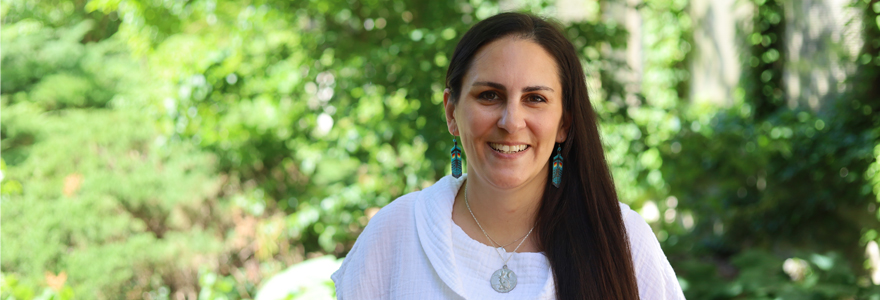News and Updates
Contact
Faculty of Social Science
Social Science Centre
Room 9438
Western University
T. 519-661-2053
F. 519-661-3868
E. social-science@uwo.ca
Teaching students to live Aazhawigamig, as a path to reconciliation
June 27, 2022
Story and photo by Rob Rombouts
Dr. Renée Mazinegiizhigoo-kwe Bédard wants to teach students to live Aazhawigamig, or in the space between two lodges.
Bédard, is Anishinaabeg and a member of Dokis First Nation (Okikendawt Mnisiing). She is joining the Department of Gender, Sexuality and Women’s Studies and the Indigenous Studies program. Through her interactions with students Bédard wants to give them the tools they need to be good allies, leaders, and participants in the process of reconciliation, Indigenization, and decolonization.
“A lot of students come here, and they want to know what reconciliation is in real ways,” she said. “I teach them to embody Aazhawigamig, to understand that we need to come together by that sacred fire between the lodges, to build something together so we can move forward in that constructive space.”
Being able to come together requires “knowledge, the skills to communicate new ideas and be able to use the information they have learned to live decolonization in a real way, an everyday practical way, in their jobs, lives, their families,” she said. “So that they actually understand what it means to be Canadian, Indigenous, an immigrant, on these lands, treaty lands, and what all our treaty responsibilities mean in a contemporary context.”
Bédard’s research focuses on maternal or matricentric feminism, within an Indigenous worldview, as well as Indigenous land-based knowledge and land based cultural ways of learning and gathering knowledge. She said her approach to the research is to “pick up the tools of feminism so they become a way of assisting in decolonization or the rebuilding of cultures.”
She has expanded on these ideas in papers published through Demeter Press, and in 2023, these will be published in a book Anishinaabeg Doodem-Gikendaasowin miinwaa Izhitwaawin: Anishinaabeg Maternal Knowledge and Cultural Ways of Being.
In a second book planned for 2023, Dibaajimowinan Anishinaabeg: Collected Tales for My Anishinaabeg Relations, Bédard has written new Nanaaboozhoo stories to covey traditional Anishniaabe knowledge in a contemporary context.
Nanaaboozhoo stories relate culture from one generation to the next, teaching each generation the ethical principles of how to live in a good way as human beings: Anishinaabe-mino-bimaadiziwin. The stories included in the book are new stories focused on her own traditional territory in Northern Ontario, written as if they are older traditional stories, she said.
Bédard has previously worked in the First Nations Studies program (now Indigenous Studies), as a lecturer from 2008-2011, and 2014-16.
“For me, it’s like coming home. For many years, when I previously taught here, I put a lot of work into sharing my knowledge and sharing my traditions,” she said. Her courses focus on “leading students to be the best they can be when they go back to their communities, their towns, their cities, helping them become the leaders that we all need to see create new pathways towards decolonization, Indigenization and reconciliation.”

